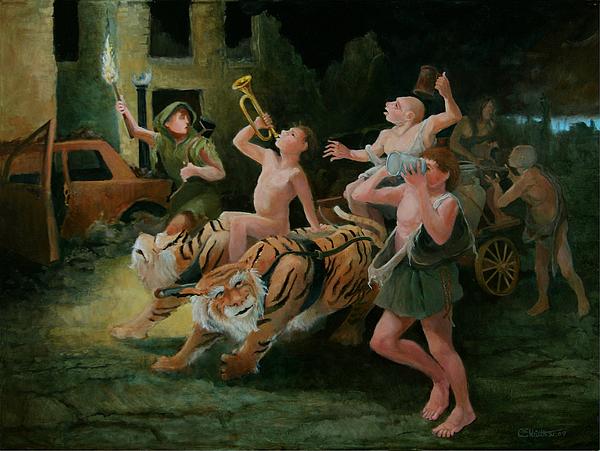
When it comes to discussing history we must remove ourselves from the now and place our minds in the past. People have not changed in their desires, pleasures, and ambitions, but they have changed in their perception of reality.
We have two-thousand-five-hundred years on classical Greece; different faiths, different science, different morality, a different culture. Music, acting, and even language had an entirely different meaning to ancient people – a spiritual meaning.
Looking at Greece, we are looking at a polytheist society, one that worshiped more than one god and viewed the world in a multi-layered narrative. The sun was dragged across the sky by a chariot of a god; the stars were the pinholes of night’s cloak. The crushing of grapes to make wine and the first bounty of the crops held a religious significance, and were aligned with deep and mysterious stories that had been told through generations.
Ancient Greece, specifically Athens, was the birthplace of the theatre. Bi-annual performances were held in honour of the wine god Dionysus, with elaborate functions featuring acrobats, musicians, artists and actors all participating in producing performances for the citizens. These performances were not entertaining reality flicks on ancient TV, but a spiritual experience. People involved – audience and actors – were engaged in ritual. Actors were assuming the living form of gods and heroes.

It was a serious affair. If a performer failed at their task they were not just heckled off the stage, but officially beaten for their inadequacy by the authority. As harsh as this sounds this was also the birth place of free speech and expression and the circus.
After the main two events in Athens the Dionysiakoi Technitai, or Artists of Dionysus, would travel around Greece visiting the outer areas as a circus troop. They’d entertain villagers on their way for donations or performed shows for nobles and kings in court. These troops, similar to circuses now, had a wide range of skilled people working for them, actors, artists, musicians, even carpenters.
Their contributions were noted by rulers of Athens and other states, who honoured the artists with privileges. In 279 BC a Delphic decree granted absolute freedoms to the technitai, with laws written in marble that ordered nations that any harm, taxation or conscription was forbidden.
These edicts empowered the performers and gave them freedoms in a way they became a state within itself. We can only speculate of how powerful these performers were; it’s possible that due to these decrees the technitai found themselves political negotiators. When there was a war between two nations the same group of performers may of entertained troops from either side on the same day, and being political neutrals they thereby became holy diplomats and spies.
We will never know, but this speculation is based on slow erosion of rights by Romans, which was followed by a much later edicts that outlawed the Dionysian (Bacchic) cult all together after the senate feared that it was too powerful and a threat to the nation in 186 BC.
Ancient writers saw words as holy and only wrote down things that were most important. Unfortunately we can only cite what they wrote. The Greeks were a market culture I have no doubt that there were buskers in the agora with hats out and dinging chimes of drachma. What we do know is that there was a reverence for performers and later a fear.
Ancient history demonstrates the power we street performers wield when we are in the public. Entertainment is not merely pleasure, it is a seductive force that can enlighten people. We should never forget our history.

*****
Sources:
The Context of Ancient Drama by Eric Csapo & William Slater.
ISBN-13: 978-0472082759 Pg. 244
http://en.wikipedia.org/wiki/Senatus_consultum_de_Bacchanalibus
(Banning of the Dionysian cult by the senate of Rome in 186 BC)
Livy, History of Rome, Book XXXIX
http://www.fordham.edu/halsall/ancient/livy39.asp
*****
Author description:
Markos Gage -Australian based professional pavement artist, writer who sometimes assumes the role of an amateur classical historian.
http://panfineart.com/